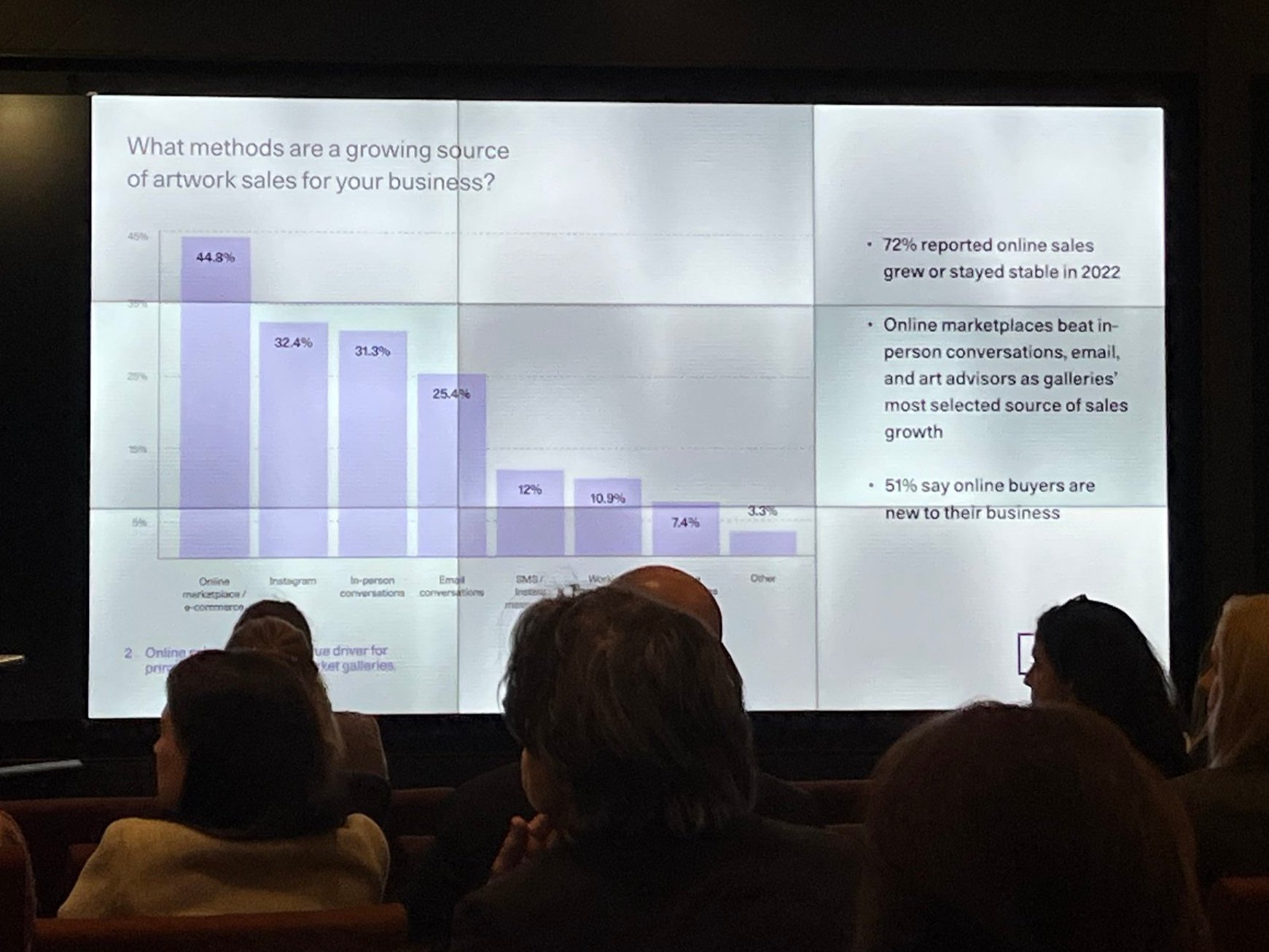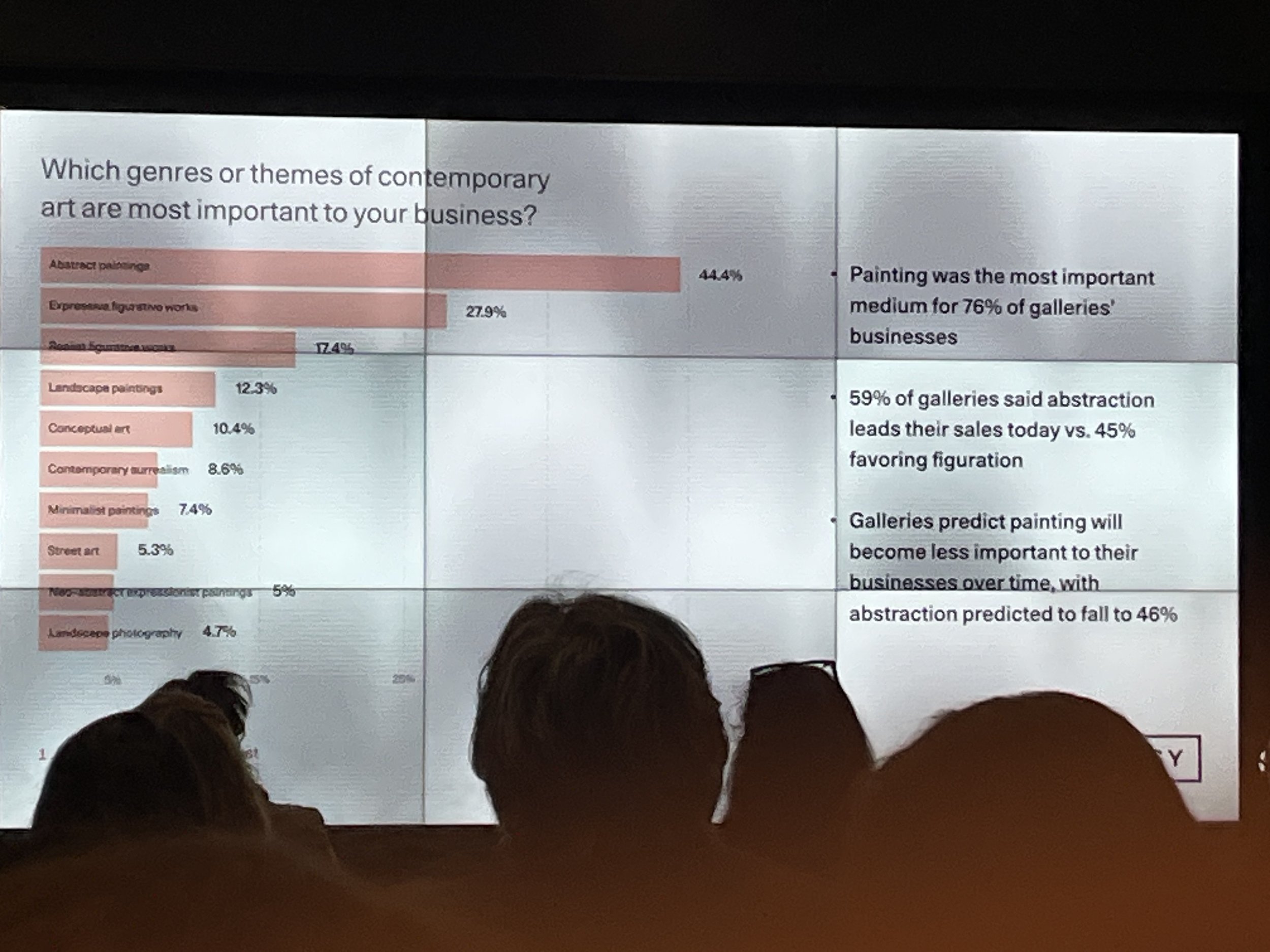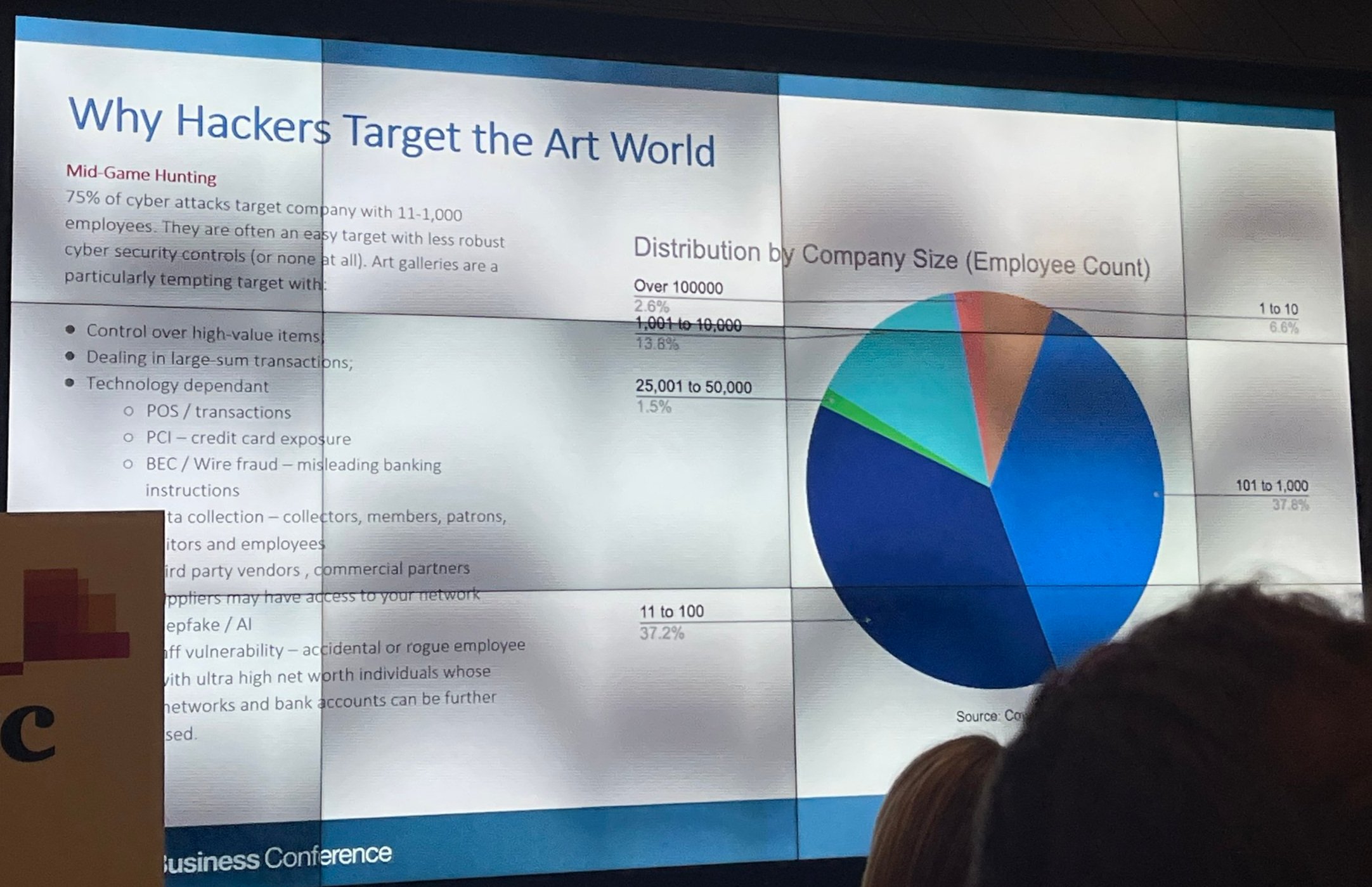After a 3-year hiatus, the Art Business Conference returns to New York, and I offer a brief summary of the key topics from the day-and-a-half event.
I have never attended the pre-pandemic iterations and thus cannot compare this one to the past. I first observed that they did not define art in a practical sense. It assumed we know. Semantic criticism is trivial but becomes important when using data to assess the state of the market. Do antiquities sold by dealers and auctions fall into this category?
The second, considerably more important observation, is that the sponsors were the primary presenters and thusly controlled the topics of conversation. It felt like sponsoring the conference delivered the company a panel in which to directly advertise their services. In addition, I think that every panel had sponsors on it. I fear the ramifications offer a contorted conversation into the specializations of the companies and not necessarily those of the field. I will get into more of this as we go.
Topics:
Sustainability
Provenance Research
Art Lending
Cyber Security
Hiring & Employment
Art & Technology
One sponsor, Convelio, gave brief presentations between panels advertising the company. The blatant advertising took some getting used to and forced me to filter the content through a scrim of financial motives.
No doubt, however, that sustainability headlined the conference as the first panel and all of the second day’s workshops addressed aspects of the subject.
Galleries Commit and the Gallery Climate Coalition again took center stage on the topic. I have seen them speak at least 3 other times and do not know if other groups do not exist or if they simply are the only ones doing the hard work in this area. In my opinion they have done great things, but as with most of the topics, they needed consult a token collections manager.
Shipping is the topic that dominates this discussion and the Robin to shipping’s Batman is sea freight. The bat signal again illuminated Gotham and drew the topic out. This time, with a key figure from Crozier on the panel, they began pushing the topic. I have written previously, about why we should not avidly pursue the solution; however, Crozier, along with Christie’s, has invested in a world-wide route and coincidentally was present on the panel discuss it. From what I know, they are the only shipper that seems ok with the format based on my conversations with people. And, the insurers…
However, Crozier and I both agree on the use of data to make decisions and inform change. In this case, they use data to relieve insurers’ concerns about the risks of sea freight.
Liz Bloomfield from Marianne Boesky Gallery explained how they charge $35 per purchase to go toward the Art to Acres organization. This is a great solution that I wished for a few years ago in the form of a percentage on a purchase. Either way, you shift the burden of sustainability from the objects (sea freight) to the usage of the object and, thus, to those who can more likely afford it.
The panel on art lending did not offer anything new or radical. It exists, and more and more banks do it. However, one should consider the motives of the institution lending to you and if you want to allow them access to your background and your collection.
Some stats:
Generational shift: Millennials and Gen-Xers represent the majority of loans
Millennials represent 41% of buyers in the art market
Continued diversification of buyers and the types of works they buy
The post-lunch coffee did not wake up attendees as well as the cyber security panel. Some notes.
Primarily money and trade secrets sought
Data is a means to an end
The pinnacle of hacking is an administrator’s credentials
Users must minimize access to data. Access on a need to know basis.
Users are conduit to someone else
Avoid password reuse. Use a cloud password manager like Dashlane or CyberFox
Phishing emails remain the biggest problem
Get to know your vendors and do not give them access to your data
Dedicated IT services preferred if possible
People inside your email inbox is one of the biggest threats
Archive email. Do not store years’ worth of data in email form
Do not email passwords
Train employees about security best practices
Most attacks occur on long weekends
Get cyber insurance
Different passwords
Use two-factor authentication whenever possible
Be aware of what information you expose
Make cyber attack emergency plans
Minimum actions include:
Cloud hosted services like email
Do NOT mix work and personal data (different computers for example)
The last two panels, hiring and art and technology, did not resonate as much with me and will not squat prominently in the lines of this text.
Suffice to say, that hiring around the world continues to make headlines. As one panelist put it (paraphrasing), following on the heels of the “Great Resignation”, we have entered the era of the “Great Negotiation”. Exemplifying that trend, salaries in the United States have overall risen while in the United Kingdom they have remained much the same. Side note, Los Angeles exhibits one of the largest areas of growth in hiring.
Panelists (mostly the attorney Ruofei Xiang) emphasized the importance of documentation such as employee handbooks as a key part of establishing expectations between employer and employee amidst such prescient issues as DEIA, labor disputes, and harassment complaints. Documentation changes with each state.
I asked about differentiating between contractors and employees in the wake of the laws in California protecting independent contractors. Independent contractors have a fair amount of freedom in how they go about their work and a company cannot impose a company-wide standard on them. On the other hand, employees work under company standards using company tools.
The panel lastly reiterated the importance of mentorship, internships, and competitive entry-level salaries in the face of talent acquisition and employee retention.
The final panel of the day, art and technology, felt more like publicity than a detailed discussion about technologies transforming the sector. Two of the three panelists, Artsy and Convelio, use technology to offer their services – a marketplace and shipping respectively – but do not make new technology that transform how we work. Artlogic, conversely, does develop platforms to help clients achieve new, aspirational goals. In the end, they had to have a debate if they were tech platforms at all. Telling. Regardless, I wanted more tech, more transformation, more blockchain, more AI, more DAOs.
Day two provided more in-depth discussion of climate and sustainability issues. I found it mostly repetitive but did like the discussion about climate control and HVAC, to me a vastly more important issue than shipping because, again, it does not stress objects in order to lower fossil fuel emissions. See our HVAC webinar here.
Heath Lowndes of the Gallery Climate Coalition did an interesting tutorial about their Carbon Calculator which I found useful. It immediately made me wish someone would embed this calculator in our collections databases so that entering shipping information about a piece automatically calculated its emissions. I will pitch this to them.
The conference was overall useful and offered plenty of time for networking as well. I really enjoyed the fact that it focused on business because I advocate for market-based solutions to many of these problems. I think that financial incentives –which abound – will more rapidly beget change. I did, however, wish for a greater recognition of collections management as a source of value and revenue. My bias speaks here, but I do believe it is objectively true that many of these issues maintain collections management at their shoulder-chipped core, and could be more quickly solved if they brought us in to the conversation earlier. As a result of the conference, I aim to push for more representation outside of our own professional silos.







